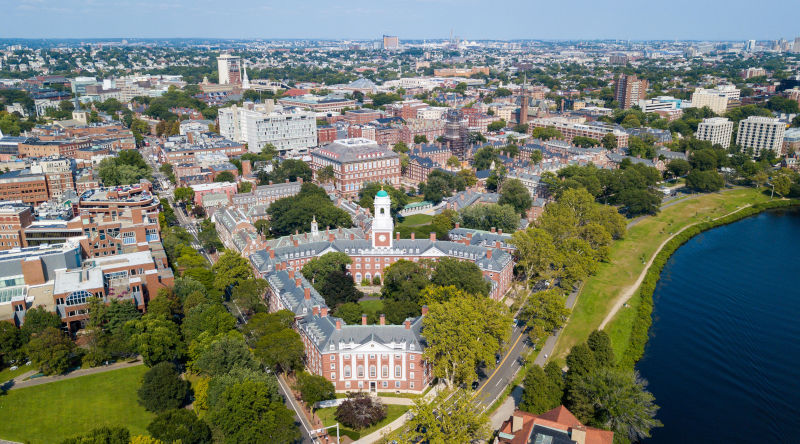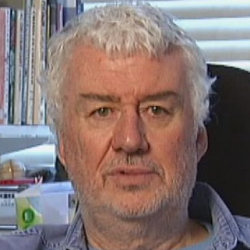A Joycean defence of Harvard (and Australia’s universities?) from Trump’s derangement Part 2 of 2
June 12, 2025
In the context of President Donald Trump’s all-embracing appetites and hatreds, Harvard being under attack by his administration should, almost reflexively, be easy to defend.
But it isn’t. And a prime reason for this is that the iconic bastion of higher learning derives its reputation from a hubristic interpretation of its history which, from other, ethical and human perspectives is a record of crude and vulgar service to American power.
An anecdote about a woman who approached James Joyce at a party and asked to “shake the hand that wrote Ulysses” is a wry reminder of the defender’s discomfort: Joyce is said to have replied, “Let me remind you, madam, that this hand has done many other things as well.”
Unashamedly, Harvard rejoices in its status as what might accurately be described as a hybrid condottiere-consigliere. In 1959, Harvard president Nathan Pusey made the following observation about his institution:
The sort of activities that goes on in the classrooms and laboratories of Cambridge is contributing vastly to the immense national efforts we are making and shall have to make to live up to our nation’s acquired responsibilities in the world and to compete effectively in this life-and-death struggle in which it seems that we are to be engaged for a long time with our alien rival, the USSR . . . Harvard is no stranger to such struggles… Our university has done its part — and more — in every conflict in our nation’s history.
Although everything that Pusey had to say about Harvard was, and remains, true, it is the invocation of “every conflict in our nation’s history” that deserves particular examination because of the evident pride Pusey expresses in relation to them.
His evident concern to laud Harvard’s substantial contributions without reference to the causes which they have served, is an inexcusable default in a post-Nuremberg world sensitised to the dictum that patriotism and duly authorised commands are held to be subordinate to humanitarian ethics.
In other words, a prudent disposition ought to attach to notions of serving the state in general, and, given the history of the United States, serving the US in particular.
Nevertheless, and notably, it was and remains a free choice of identity enhancement since neither the government nor the private sector of the economy force academics into their respective service. But for those making the choice an escape is effected from the need to educate and supervise students; clearly, it is an attractive option for some.
Ultimately, it leads to an inversion. The more the government co-opts the university, the more its faculty becomes indentured employees with corporate orientations. Critique is sacrificed to the point where the sociologist, Sigmund Diamond, could be denied a position at Harvard on the grounds of his public, civil-libertarian resistance to McCarthyism, but the same university was untroubled by the fact that one of its scientists invented one of the most horrendous of “conventional” modern battlefield weapons, napalm; others were principal contributors to the creation of the atomic bomb.
These contributions are taken as laudatory though, understandably perhaps, not highlighted in any defender’s schedule of achievements. Through them, and many others, Harvard became the exemplar model for American universities. The consequences for education, and daily academic-intellectual life, however, are extraordinary and fraught.
Examining one of the great binaries in global strategy of the second half of the 20th century, we find that Harvard especially exerted a profound and pathological influence on the way the world was known.
This occurred because the understanding of the (Soviet) East within the East-West relationship owed much to the fact that Western Sovietology was a para-disciplinary discourse dominated and determined, in the first instance, by the importation of anti-Russian bias acquired as a result of study in western Europe, and then, research centres in the United States which, returning the compliment, appointed European and Russian émigrés who imparted the same hostility while resident in the US.
The earlier acquisition had its origins in America’s need to understand the Soviet Union in the pre-World War II period, and consequently, decisions taken by Robert F. Kelley, a Harvard graduate and former instructor, who was head of the State Department’s Eastern European Division from 1924-1938. In this period, he ensured that his Soviet specialists were trained in either Paris or Berlin as were, for example, Charles Bohlen (later ambassador to the USSR), and George Kennan, respectively.
Both deserve the title “fathers of containment,” Kennan more so, but not just because of the famous “X” telegram. His early writings and memoirs are marked by the adoption of the 19th century dichotomy between Teutons and Slavs wherein German culture was viewed most favourably, whereas Russian civilisation was seen as unchanging and barbaric.
The later effect was obvious and stark when Harvard’s Russian Research Centre, was responsible for training American Sovietologists after 1945 and the course offerings were seen to follow in the intellectual tradition of Kennan.
Thus, the peoples of the USSR were either described in terms such as “heathen” or “primitive”, or genealogically linked with Genghis Khan (which amounted to the same thing). Not only was a permanent Soviet threat thesis perpetuated, but also a contempt and/or hate for the country which was the object of study.
Further, it was a disposition which could be sustained without great difficulty by the practices of recruiting Cold War intellectuals who shared the animus – such as Zbigniew Brzezinski, Henry Kissinger, Talcott Parsons, Richard Pipes, Thomas Schelling and Adam Ulam.
Appointed to positions of authority within the foreign policy discourse, they passed it on to successive generations of students and graduates who also rose to prominence within the policy-making bureaucracy – such as John J. McCloy, Robert McNamara, Donald Regan and Caspar Weinberger.
Yet it is important to understand that such intellectuals were only the more visible and constant reminders of the discourse of Soviet-hating at Harvard and in the US. more generally.
Eventually, Harvard was the host-mentor: as Diamond concluded, “the intelligence aspect of the work of the Russian Research Centre and the research aspect of its work cannot be distinguished".
What could be distinguished, however, were those who were identifiably neither Eastern European, nor Russian, and whose presence confounded the declared tenets of every American university.
Throughout the 1970s and 1980s, Samuel P. Huntington, director of Harvard’s Centre for International Affairs, delivered a schedule of anti-democratic fulminations which appeared to make no difference whatsoever to his continued standing at the university, or his role as an adviser in the Carter Administration.
These included that the foreign policy elite were even right to deceive the citizenry about the true nature of American interventions and other military actions essentially on the grounds that:
- deception was an inescapable attribute of the process of government;
- some people no longer accepted their inferiority to the governing classes;
- democracy is possessed of a “distemper” or “excess” which facilitates “previously passive or unorganised groups in the population… blacks, Indians, Chicanos, white ethnic groups, students, and women [to embark] on concerted efforts to establish their claims to opportunities, positions, rewards, and privileges, which they had not considered themselves entitled to before”; and
- effective democracy “usually requires some measure of apathy and non-involvement on the part of some individuals and groups".
Earlier, in the 1960s, Huntington had designed the forced urbanisation of the South Vietnamese peasantry as a legitimate instrument of US strategy and, in so doing, was the architect of the reduction of the rural population of the country by some 30%, the consequential transformation of Vietnam from a food exporter to a food importer, and the parallel legitimation of a rural bombing campaign over five times more intense than the US campaigns against Germany and Japan in World War II combined.
In the same decade he also advocated that political scientists become social engineers rather than theoreticians, and, quite consistently, that US foreign policy concern itself less with the development of democratic government among its allies and other states with which it had influence, and more with supporting those who were, no matter their undemocratic character, effective.
Kissinger, of course, was welcome in this milieu, no objection being raised to his presence, let alone academic status, despite the fact that his record of foreign policy stewardship is, literally, strewn with support for assassination, murder, and coup d’etat (Chile, 1973), betrayal in the name of power politics (Kurdistan/northern Iraq, 1975), invasion and subsequent genocide (East Timor, 1975), just to name three representative examples, the last two of which produced a combined death toll of at least 150,000, and 600,000 refugees.
Other beneficiaries have included numerous Harvard professors such as Richard Betts and Huntington, who published an article in International Security in 1986, based on research funded by the CIA which that agency would not allow to be acknowledged.
As Australian universities continue their trajectory away from taking education seriously, their passage will follow the same tragic libretto of decline and fall and be scored to the marching hymn of corporatism as Harvard (albeit on a smaller scale).
Can it happen? Yes. When will it happen? Now. How will it happen? Look around. Wolseys in profusion. Recall Joyce.
Readers might also be interested in Part 1, also from Michael McKinley
The views expressed in this article may or may not reflect those of Pearls and Irritations.


